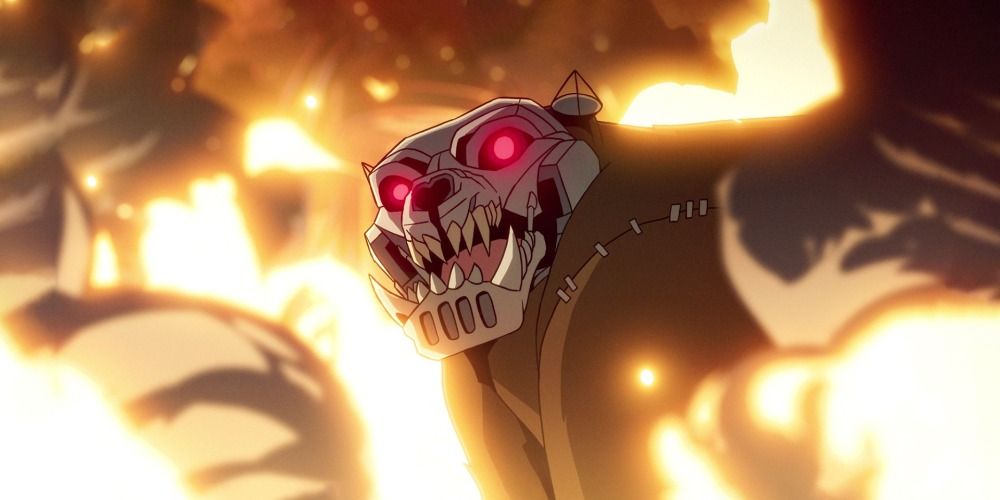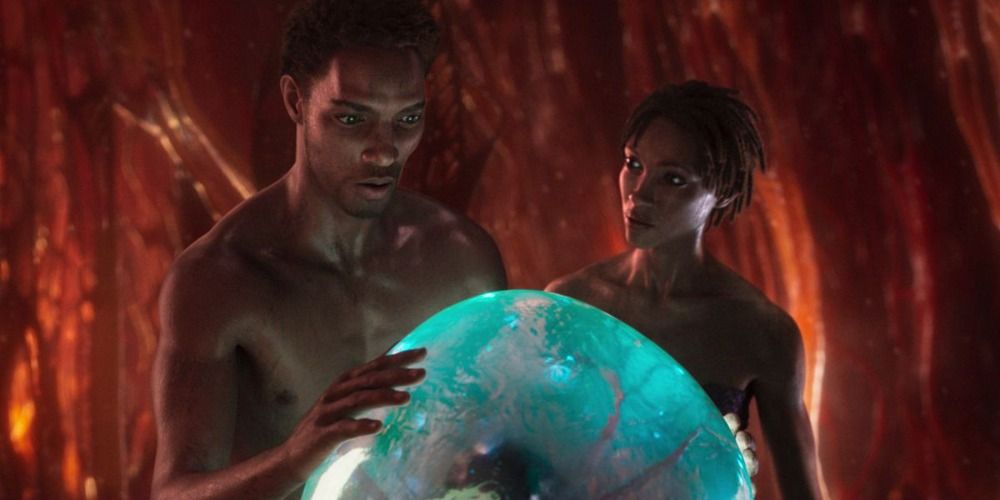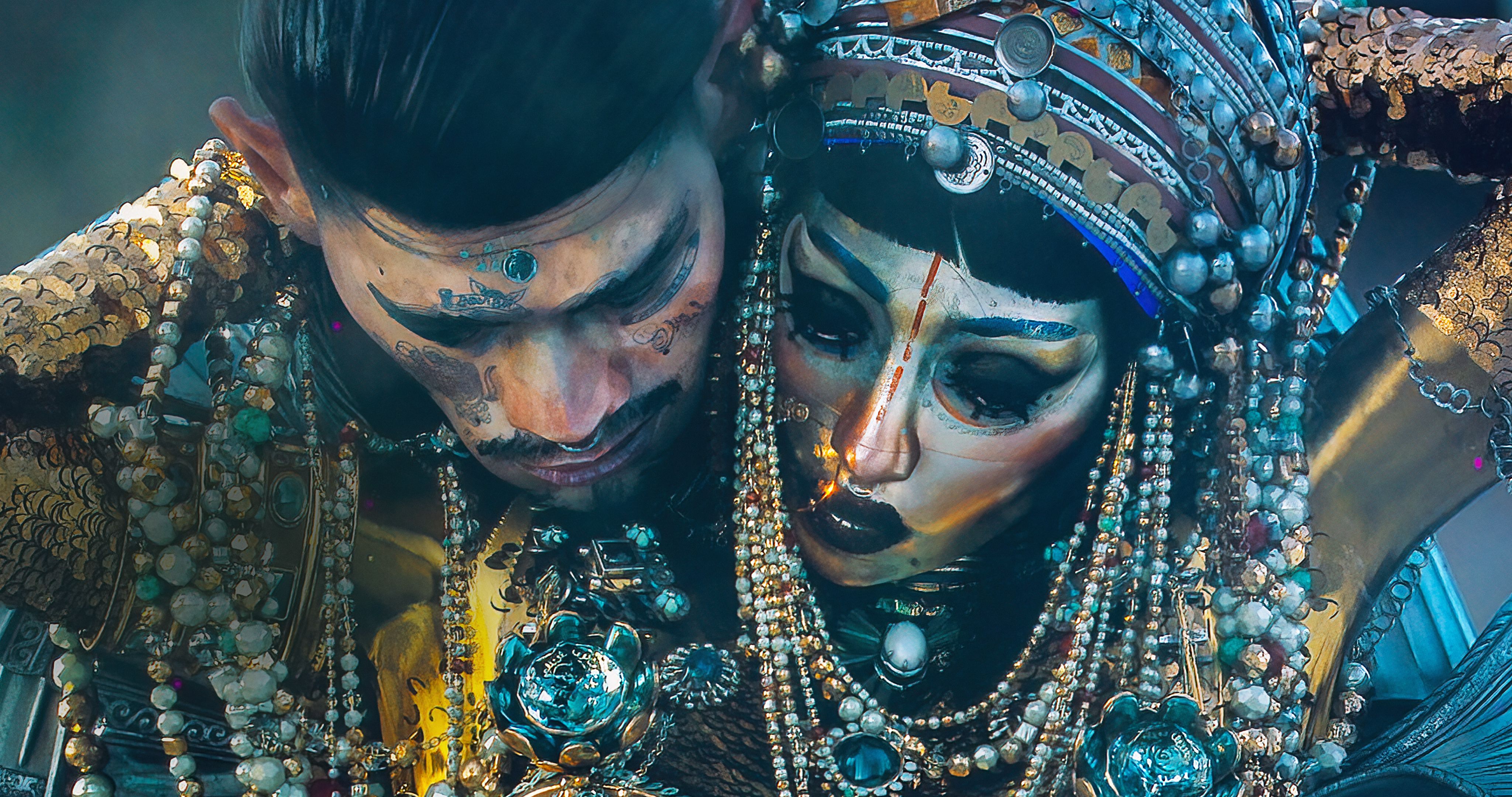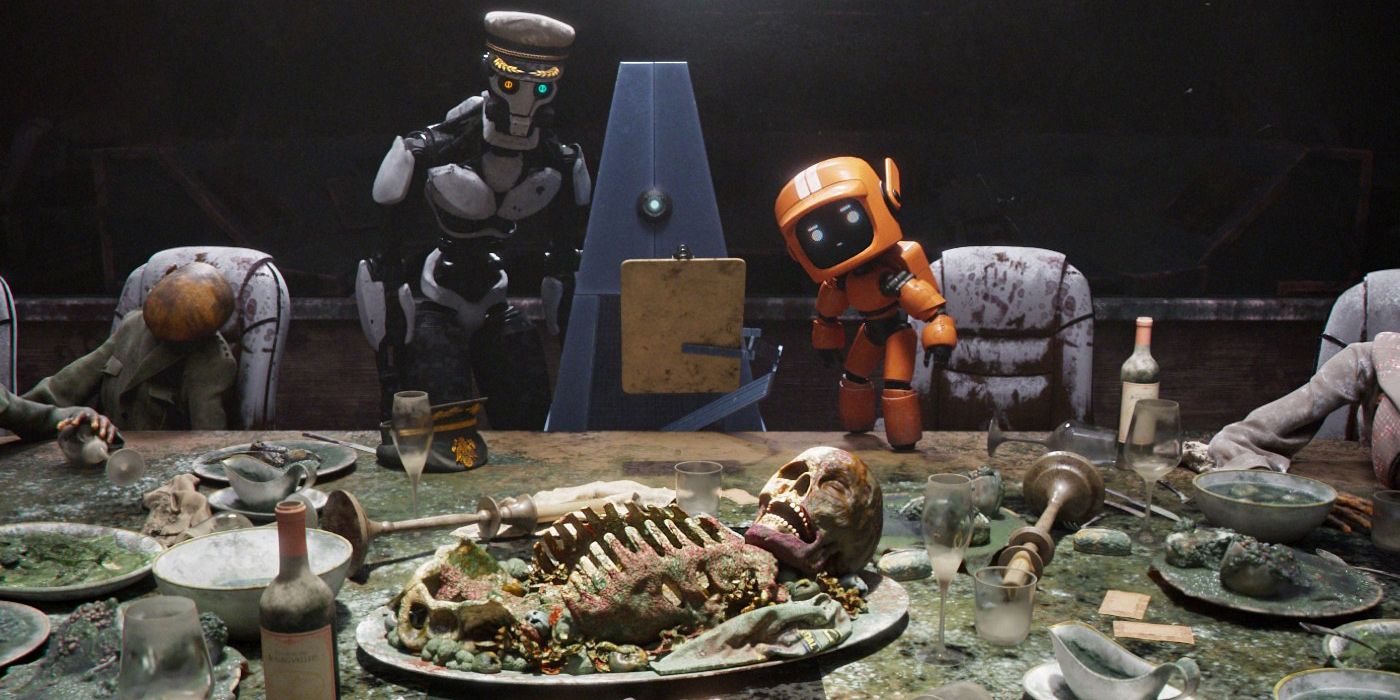Is Love Death and Robots Supposed to Be Funny
'Love, Death + Robots' Volume 3 Is All About Humanity's Greed and Self-Destructive Nature
Captivating stories hide dark themes, but you might not notice it at first!
Editor's note: The below article contains spoilers for Season 3 of Love, Death + Robots.With a brand-new season of stories to tell, Love, Death + Robots once again encapsulates thrilling and sometimes even beautiful stories in animated forms that can take our breath away. While there is no rule that these stories need to be intertwined within one another, there was something interesting regarding the themes of the third season. Save for one episode, every story related to humanity and our almost poetic self-destructive nature. From a self-guided robot tour of the post-apocalypse to ancient chthonic horrors, each episode has something to do with our ability to cause our own undoing.
This theme is most blatantly portrayed within Season 3's first episode: "Three Robots: Exit Strategies." In this episode, which serves as a sequel to Season 1's "Three Robots," viewers once again accompany K-VRC (voiced by Josh Brener), XBOT 4000 (Gary Anthony Williams), and 11-45-G (voiced by a computer program) as they wander a wasteland of skeletons and empty bases in pursuit of knowledge regarding the end times. The story pokes fun at a lot of the tropes we would expect to arise in an apocalypse setting, such as those who would attempt to survive solely on "bullets and venison jerky" or the tech millionaires who relied too heavily on technology to save them. While it is meant to be humorous, it also blatantly shows that our greed and pride will easily cause our extinction should such an apocalyptic event occur. In that world, humans had hunted any animal larger than a cat to extinction, and those with the money to save the planet instead attempted to flee towards Mars and leave everyone else to solve the problem themselves. In this way, the first episode of the season states primarily that we are the ones who will cause our own destruction. There's another episode that hits this theme precisely, but one might not see it past all the gore and over-the-top action that it's spewing at their eyes.
The fifth episode, "Kill Team Kill," takes place right at the beginning of the Global War on Terrorism. The story follows a group of US Special Forces operatives as they attempt to regroup with another squad. What they end up finding, however, is that their other squad was absolutely decimated by a cybernetically enhanced bear. This bear turned out to be a secret CIA project codenamed "Barghest" meant to be used to gain an edge in the war, but it started to "behave unpatriotically" and killed everyone around it. While the team does eventually defeat the Barghest with enough bullets and explosions, nobody survives the last battle. This continues the theme of self-destruction, as it was the CIA's disdain for the enemy of their war that led them to create such a creature, and it was through their own creation that they met their grizzly end. If they weren't so focused on finding ways to kill other humans, the ones they saw as their enemies, then perhaps their own lives would have been spared of all the violence and torment. In an interesting surprise, there's another episode that takes the premise of "US military fighting against terrorism" but it takes a drastically different turn.

Episode 8, titled "In Vaulted Halls Entombed," starts like you might expect any military story would: a squad of US soldiers is tracking enemies that have a hostage, and they soon follow them to a cave that they believe to be their base. What waited for them inside, however, they never could have predicted. The hostage is found to be dead, along with their captors. Their bodies are picked clean, down to the bone. Despite the acknowledgment that their mission was over, the squad leader demands to head further into the tunnel to find out what happened. Things take a drastic turn when tiny alien creatures begin to swarm the squad and eat them alive, and in the end only two soldiers remain. What they uncover is that in the center of the tunnel lies a chthonic creature demanding to be released. The two soldiers turn on one another, and the sole survivor has their mind corrupted by the creature, sent back out of the cave to do its bidding. If the squad had simply turned back after finding out that they had failed to rescue their target, then they could have avoided such a deadly fate. One last episode from this season is blatantly reminiscent of the theme of self-destruction, but it chose to take a much more comedic approach instead.
In what is perhaps the most blatant parody story told in the anthology series, "Night of the Mini-Dead" simply depicts the lifespan of the zombie apocalypse as the undead take over the world. Of course, this all starts when a couple filled with lust finds themselves at a cemetery in which they show their affection towards one another in an almost hyperbolic manner. This act results in an accidental, yet comedic summoning of the undead as zombies eat the couple and move towards the blissfully unaware cities. While it could be argued that it was the lust of the couple that shows the theme of self-destruction, it's merely the appetizer for occurs at the end of the short when the world's top leaders decide to push the big red button and end it all with their nuclear missiles. In a way, it is the ultimate act of humans having this innate desire to annihilate themselves. We would rather take ourselves out on our own terms than to allow some exterior force to bring our species to an end. In Episode 6, titled simply "Swarm," the story also ends up focusing on humans as a species and how they are doomed to destroy themselves.

The key story from the episode "Swarm" is that humans are so intrigued by this ancient "civilization" of giant autonomous space insects that it wants to harness their work abilities to further their own progression in the galaxy. Two humans work to see if they can recreate the pheromones necessary to control the Swarm. While the Swarm seems to have no sentience at first, it is revealed that the Swarm can and has in the past developed an "intelligence caste" to deal with outside threats attempting to exploit it. The caste states that the humans are doomed to collapse upon themselves, going on to explain that "intelligence is not a winning survival trait." In other words, it is our own desire to learn, our innate passion to improve, that will ultimately lead to our self-destruction. It offers a choice to the remaining human, as it took over the other scientist in order to understand the humans and speak their language: help the Swarm to create humans that will defend them against the inevitable army that will come for them, or experience "real ugly events" which would include being absorbed forcefully. This intelligent being that represented the Swarm had seen greater species fall, and yet even after explaining that the scientist was unphased. He represents the stubbornness of the human species and the ceaseless desire to feel that we are different, that we are unique. Ultimately though, it's that stubbornness that will surely cause our untimely downfall. There's one episode that also depicts a tragic story of downfall and the pains of human emotion, and it centers around a ship that finds itself having bad travels.
While the second episode, "Bad Travelling," does show a somewhat direct view of self-destruction, it does so in a much more methodical way which makes it stand out from the rest of the "direct" episodes. This episode, which focuses on the crew of a ship as they deal with a giant crab monster dubbed the "Thanapod," follows Torrin (voiced by Troy Baker) as he attempts to bear the burden of resolving the monster issue. The Thanapod kills the ship's captain, and upon meeting Torrin it demands safe travel to Phaiden Island so that it may feast on more humans. Torrin, not one to bear the guilty conscience of making the creature someone else's problem, attempts to sway the crew to instead deliver it to a deserted island farther off. The crew is shown to be selfish, however, and one by one Torrin finds himself killing the members and offering their corpses as meals for the gluttonous crab beast. The crew becomes self-destructive, always looking for someone else to take care of their problems for them. By the end, only Torrin stands, and he burns the Thanapod down with the ship as he makes a hasty escape in a rowboat. What makes this episode so unique is that Torrin isn't necessarily a villain, but he is also the one who kills off the crew until it is just him alone. He, too, was key to the destruction of the ship's crew, and in that way, he was just as destructive as those who originally threw him under the ship. Often times it is our greed that precedes our undoing, and that is especially reflected in the season's last episode.

The story of "Jibaro" follows a deaf knight as he becomes entangled with a siren whose voice holds no effect on him. While the siren is intrigued and even attracted to this man that does not falter to her screams, the knight is only interested in the gold and jewels that adorn the siren's body. Eventually, the deaf knight is able to get close enough to the siren to knock it unconscious, stealing all of its adorned riches and attempting to flee back home. Unfortunately for him, when the siren awakes and finds itself stripped of all that it had, the waters that it resided in turned blood-red, and upon drinking from it unknowingly, the knight gains his hearing back. This makes him vulnerable to the siren, however, and when it wails in agony over its betrayal, the knight can't help but to stir and dance helplessly to his death below the waters. Without a single word being spoken, "Jibaro" depicts a chilling tale of greed and how it can lead any man to his death. Sometimes though, our greed doesn't kill us, but those around us.
It's easy to miss the beginning dialogue of "The Very Pulse of the Machine" as it precedes a much more enthralling story, but those who pay attention will note that the small talk being thrown back and forth between Martha Kivelson (voiced by Mackenzie Davis) and Juliet Burton (Holly Jade) is about how they are pushing themselves beyond the limits of their rover to collect more data on Io, one of Jupiter's moons. This decision is the act of greed, and it shows its ugly consequences soon after as an unexpected sulfur eruption causes the death of Burton. During her travels, Kivelson ends up having to administer a variety of drugs to keep moving, and either through the hallucinations of these drugs or through some incredible work of science-fiction, the moon begins to speak to her through Burton's body. When Kivelson passes out, the moon seemingly possesses Burton and carries the unconscious Kivelson to a cliff facing a pit of molten sulfur. Io speaks to Kivelson and says that her mind might be preserved within the moon itself. Having no other choice, Kivelson willingly falls into the pit, letting the moon absorb her entirely. Kivelson's greed for knowledge led to her own death and the death of Burton, but she finds peace in knowing that she may become part of something grander.
We can't help but be ourselves, to be human. It is what drives us in every aspect, and we are far from perfection. Love, Death + Robots offers up a chance to see our flaws in ways that we might never have noticed before. Sure, sometimes the story is just a fun way to entertain others, and not everything needs to be dissected for meaning in the first place. That being said, it's increasingly intriguing that, despite there not being a requirement of a theme for the stories to work off of, a theme emerged regardless. That theme of greed and self-destruction arose through a majority of these stories from the third season, and once the connection was made there was no going back. Interestingly enough, the one story that doesn't focus on self-destruction or greed, "Mason's Rats," instead gets a happy conclusion because it shows an ability to step away from the greed and embrace the humanity within another species. It stands as the sole rebel against the theme, and it is without a doubt the story that attempts to say that we aren't doomed to destroy ourselves. Rather, it is our choice whether we become the true villain of our story, be that on an individual level or as an entire species.
Source: https://collider.com/love-death-and-robots-season-3-themes-greed-self-destruction/

0 Response to "Is Love Death and Robots Supposed to Be Funny"
Post a Comment